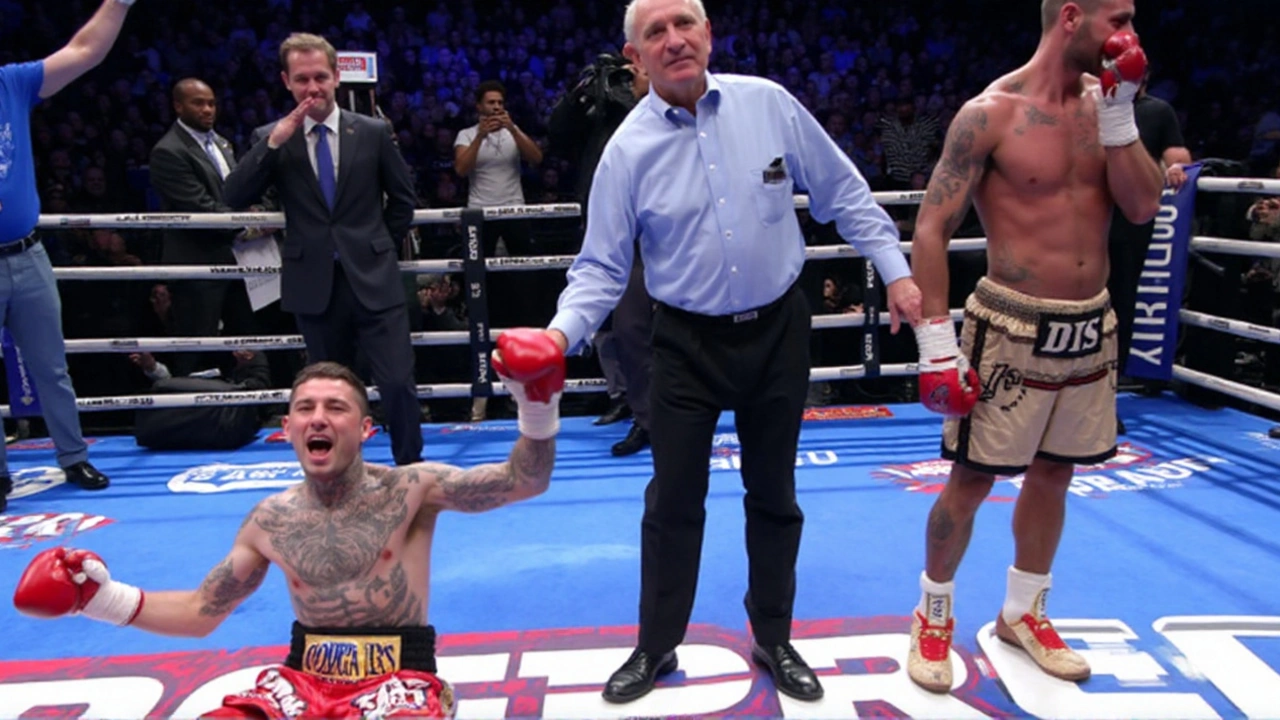Lewis Crocker stuns Paddy Donovan at Windsor Park to claim IBF welterweight title

A split decision that flipped the script in Belfast
An underdog won the night. In front of a roaring Windsor Park on September 13, 2025, Lewis Crocker seized the IBF World Welterweight Title with a split-decision win over Paddy Donovan, overturning the pre-fight narrative and sending Belfast into full voice. Promoted by Matchroom Boxing, the 12-round fight swung through momentum shifts, clean counters, and a late surge that tipped a razor-thin result toward the hometown fighter.
Crocker did not have a clean night. He was on the floor, he had to reset, and he had to convince three judges round by round. That is exactly what he did. He boxed smarter as the fight wore on: tighter guard, more patience on entries, and selective bursts when Donovan’s lead hand drifted out of position. Afterward, he boiled it down simply: he felt he was picking his shots well and catching Donovan when he wanted to. That ability to choose the moments—rather than chase them—kept him in control when the fight threatened to slip away.
Donovan entered as the favorite for a reason. The Limerick southpaw came in with the cleaner form, the longer lines, and the widespread belief that he’d break down Crocker over the stretch. Early on he had success with the jab and that left hand that he likes to slide through tight spaces. But Crocker’s timing improved. He found the body when the exchanges got too tidy, then brought the right hand over the top when Donovan circled off the ropes. The rounds got messy in the best way: both men biting down, both landing, neither interested in giving the other more than a few seconds of comfort.
The split decision felt like a fair reflection of that story. No blowout, no easy answers, just a fight decided by the kind of details judges obsess over—who finished exchanges, who controlled pace, who made the ring feel bigger or smaller. Belfast, famously loyal to its fighters, added weight to everything Crocker did in the championship rounds. The atmosphere wasn’t just loud; it was the kind of noise that tells a judge when a punch matters.
This was billed as their second meeting, and it had a sequel’s edge to it: more tension, more adjustments, more ego on the line. Crocker’s win doesn’t erase what Donovan does well, and it doesn’t suddenly make him ordinary. It confirms that at world level, small choices—when to step, when to feint, when to sit on a shot—swing big outcomes. Donovan had moments that would win most nights. He just ran into a man who matched his skill with resolve and then found a little extra in the last third of the fight.
The stakes were huge beyond the belts. Windsor Park is a venue with history, and Belfast has long measured its fight nights by their echo—how they feel a week later, a month later. This one will linger. Crocker brought a world title home on a night when many picked him to be stopped. That flips a career. It also resets the welterweight picture: the IBF crown comes with mandatories, politics, and possibilities, and Crocker now has leverage he’s never held before.

Carl Frampton, a city’s standard, and what comes next
You could feel Carl Frampton’s shadow in the stadium from the first bell. The former two-weight champion knows Windsor Park as a stage, not just an address, and he said beforehand he planned to savour the big-night battle. Post-fight, he nodded to both men and the occasion—Belfast back under the glare, a world title on the line, and a home fighter rising to it. That matters here. Frampton’s era set a benchmark for what a Belfast card should feel like; Saturday night met it.
Tactically, Crocker’s blueprint will get a closer read in the coming days. He managed the southpaw angles without getting greedy, used feints to freeze Donovan’s back foot, and made small pivots that kept him off the center line. The body work helped. So did a tempo that made Donovan think before throwing the left. None of it was flashy; all of it was effective. For Donovan, the tape won’t be a horror show. He boxed well enough to win plenty of rounds and showed the kind of composure that usually carries a close fight. The rematch question will hover because that’s how close this felt, but contracts and mandatories will speak louder than wish lists.
The undercard did its job, too, feeding the crowd and setting the tone. Middleweight Aaron Bowen scored a second-round TKO over Carlos Miguel Ronner, a fast, clean finish that sent a jolt through the stands. Jim Donovan, cousin of Paddy, made a composed professional debut with a points win over Lukasz Barabasz—tidy work, no nerves, the kind of start you want when the spotlight is bigger than your record.
Promoter Matchroom Boxing leaned into the local pride, and the city gave it back. There is a specific pitch to Belfast noise—raw, warm, unforgiving—that turns a tight round into a referendum on will. Corks popped under the concourse as the belts got packed up, and everyone had a theory about the swing rounds. That’s the sign of a proper main event: people go home arguing, not shrugging.
What now? The IBF strap brings immediate choices. A first defense in Belfast would sell itself and keep the stadium momentum rolling. A trip abroad would cash in the upset and chase a unification track. Team Donovan, meanwhile, has grounds to push for another crack—on performance, on narrative, and because rivalries like this are good business. Boxing’s calendar is a puzzle; nights like this give matchmakers several pieces at once.
For Crocker, the more important change is internal. He is no longer a contender with potential; he is a champion who proved he can pay off a hard night with the right answers. For Donovan, the loss is a detour, not a dead-end. He boxed with poise and ambition, and those traits don’t evaporate because a tight call went the other way. If anything, both men walk out bigger: one with a belt, the other with the kind of performance that keeps his phone ringing.
By the time the lights cooled and the ring was stripped, Windsor Park felt like it had breathed out. Belfast wanted a big-night fight and got one. It got a champion crowned, a favorite pushed to the brink, a reminder of what this city sounds like when the stakes are real. And somewhere in the mix, Frampton’s grin said it all: this is what Belfast boxing looks like when it’s alive.